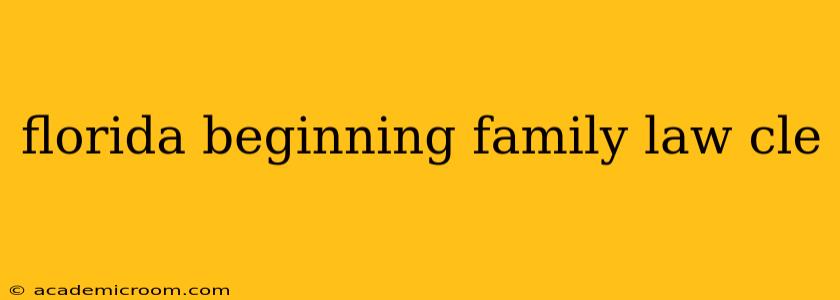Navigating Florida's family law system can be complex, even for seasoned attorneys. This comprehensive guide will help you understand the essential components of Florida beginning family law CLE courses and what to expect when participating in them. Whether you're a new attorney just starting your practice or a seasoned professional needing a refresher, understanding the intricacies of family law is crucial for effective representation and client advocacy.
What is Family Law CLE in Florida?
Continuing Legal Education (CLE) in Florida is mandatory for attorneys to maintain their licenses. Family law CLE courses provide crucial updates on case law, statutes, rules of procedure, and best practices in handling family law matters. These courses are designed to equip attorneys with the knowledge and skills necessary to represent clients effectively in divorce, child custody, child support, domestic violence, and other related areas. Florida's requirements specify the number of hours needed in specific areas of law, including family law.
What Topics are Typically Covered in Beginning Family Law CLE Courses?
Beginning family law CLE courses in Florida usually cover a broad range of fundamental topics, including:
- Jurisdiction and Venue: Understanding which court has the authority to hear a case and the proper location for filing.
- Service of Process: The legal methods for notifying parties involved in a family law case.
- Pleadings and Motions: Properly drafting and filing initial pleadings, responses, and motions.
- Discovery: Gathering information and evidence through interrogatories, depositions, and requests for production.
- Temporary Orders: Securing temporary relief, such as child custody or financial support, during the pendency of the case.
- Child Custody and Support: The legal framework for determining custody arrangements and child support obligations. This often includes understanding the "best interests of the child" standard.
- Equitable Distribution of Marital Assets: Dividing property fairly between spouses in a divorce.
- Domestic Violence: Addressing domestic violence issues, including injunctions for protection.
- Enforcement of Orders: Dealing with situations where one party fails to comply with court orders.
- Ethical Considerations: Navigating ethical dilemmas specific to family law practice.
How to Find and Choose a Florida Beginning Family Law CLE Course?
The Florida Bar provides a comprehensive list of approved CLE providers. When choosing a course, consider the following:
- Instructor Expertise: Look for instructors with extensive experience and a strong reputation in family law.
- Course Content: Ensure the course covers the fundamental topics relevant to your needs.
- Course Format: Select a format that best suits your learning style (in-person, online, webinar).
- Course Reviews: Check online reviews from other attorneys to gauge the quality of the course.
What are the Benefits of Attending a Florida Beginning Family Law CLE Course?
Attending a Florida Beginning Family Law CLE course offers numerous benefits:
- Meeting Continuing Legal Education Requirements: Successfully completing the course helps fulfill mandatory CLE requirements.
- Improving Legal Skills and Knowledge: Gain a deeper understanding of the intricacies of family law.
- Staying Current on Legal Developments: Learn about recent case law, statutory changes, and rule amendments.
- Networking Opportunities: Connect with other attorneys and professionals in the field.
- Enhanced Client Representation: Improve the quality of your legal representation by staying updated on the latest legal trends.
How Much Does a Florida Beginning Family Law CLE Course Cost?
The cost of a Florida Beginning Family Law CLE course varies depending on the provider, course length, and format. It's best to check the provider's website for pricing information.
Are there online Florida Beginning Family Law CLE Courses?
Yes, many providers offer online and webinar-based courses for attorneys' convenience. These courses offer flexibility and accessibility for attorneys with busy schedules.
What are the Key Differences Between Beginning and Advanced Family Law CLE Courses?
Beginning courses cover foundational knowledge, while advanced courses delve into more specialized and complex topics like high-conflict cases, appeals, or specific aspects of child custody.
This guide should help you navigate the world of Florida beginning family law CLE. Remember to always consult official Florida Bar resources and relevant statutes for the most up-to-date and accurate legal information.
